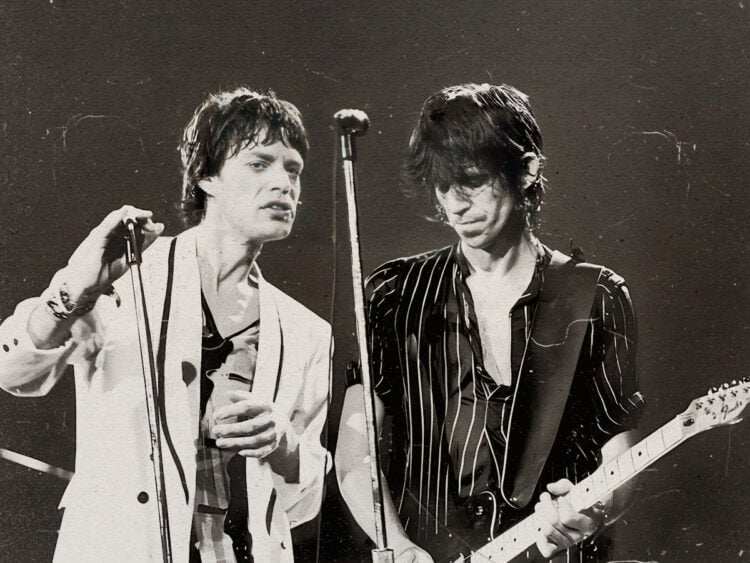News The “crap” Rolling Stones song that became an anthem: “We cut it as a comedy track”
With his rock ‘n’ roll pirate of the high seas aesthetic, penchant for rum, and lust for the barebone soul of music at its swaggering finest, it’s no surprise that Keith Richards is a big fan of reggae. Equally, given the footloose approach to genre and liberal take on appropriation that The Rolling Stones propagate, it’s no surprise that the band ventured towards the Caribbean style for a song that started out “crap” but later became a classic.
“What I love about reggae,” Richards regales in the aptly named 2015 documentary, Under the Influence, “is that it’s all so natural, there’s none of this forced stuff that I was getting tired of in rock music.” He then goes on to clarify, “Rock ‘n’ roll I never get tired of, but ‘rock’ is a white man’s version, and they turn it into a march, that’s [the modern] version of rock. Excuse me,” he adds humorously, “I prefer the roll.”
When it comes to bands lacking that sacred “roll”, Richards has scathingly indicted the likes of Led Zeppelin who he calls too “acrobatic”, The Band who he says are too “strict”, and even The Beatles who he said got too “carried away”. However, he even admits that one of his tracks may have inadvertently had a little too much roll for its own good at a time.
After all, the natural rhythms of reggae can’t be forced, and The Stones nearly paid a heavy price for trying to do so. ‘Start Me Up’ might be one of Keith Richards’ favourite riffs in the band’s back catalogue, but back when they were fashioning the 1981 hit as a reggae piece it was almost condemned to the ash heap of history.
As Richards told Guitar World: “I was convinced that was a reggae song,” while they were fashioning it in the studio. “We did 45 takes like that,” he continues, recalling the tiresome process. “But then on a break I just played that guitar riff, not even really thinking much about it; we did a take rocking away and then went back to work and did another 15 reggae takes.”
For a band renowned for their rough and ready ways, that is certainly a lot of takes–an amount that betrays just how key a lot of bloody hard work is to their sound and success. Although Richards was initially convinced that the riff had its roots in reggae, the rest of the band weren’t so sure. In fact, Mick Jagger even went as far as to say that it was “crap” when they first went about recording it in 1976.
It may well have been that Richards was simply swayed by a brilliant period of his own life and tried to reflect that eudaimonia on a record where it wasn’t quite fitting. When it comes to reggae and roots music Richards has always had his finger on the pulse. Back in 1973, The Rolling Stones were cutting Goats Head Soup in Jamaica, a time which he remembered fondly in an interview with Rolling Stone magazine, explaining, “[It was] very memorable, especially in that year. Because that was ’73. That was the year that [Bob] Marley and the Wailers put out Catch A Fire.” For a band who had been exiled from their home for tax reasons a few years earlier, this vibrant excursion felt invigorating.
“I remember being in Jamaica,” Richards recalls. “There was this feeling in the air, actually, that Jamaica was starting to make a mark on the map. It was a great feeling.” After the record was cut, Richards decided to stay in Jamaica for a while where he immersed himself in the vivified culture and basked in the sun-soaked glory of reggae for a while.
“There was a sense in the seventies in Jamaica that gave me a reminder of the early sixties in England, that something was happening,” he added while reminiscing the bubbling pot of the British invasion, before concluding: “‘Extra Classic’ was a song where I met my old lady, so I thought I’d carry that through.”
However, years down the line Richards had moved on and so had The Stones. After all those failed takes, the guitarist realised trying to be part of the reggae revolution was like Elvis Presley trying to be a hippie in the 1960s. So, the “crap” song was canned. But fate would soon intervene.
While recording Tattoo You, Jagger rediscovered the rock version of the riff that Richards laid down and thought it was the perfect song to prove that they could break through with something visceral in the stilted era after the embers of punk were waning. Thus, the “crap” song was repurposed and soon became a classic hit, peaking at number seven in the UK, the last Stones song to break the top ten.
The whole incident is not only an advocacy of hoarding, but an indicator of The Stones’ freewheeling process. There are plenty of examples of their songs never being fully formed, until the very moment that they are. The angst-riddle masterpiece of ‘Paint it Black’ might not have started out on the sunny shores of Jamaica, but with equal incongruity it did, in fact, start out as a joke!
“Mick wrote it,” Keith Richards told Rolling Stone Magazine, “I wrote the music, he did the words. Get a single together. What’s amazing about that one for me is the sitar. Also, the fact that we cut it as a comedy track.”
Eric Easton was the band’s manager at the time and the iconic fast-paced organ playing on the tune was Bill Wyman’s attempt to make a mockery of his manager’s amateurish stylings. “Bill was playing an organ, doing a take-off of our first manager who started his career in show business as an organist in a cinema pit,” Richards explained. “We’d been doing it with funky rhythms, and it hadn’t worked, and he started playing it like this and everybody got behind it. It’s a two-beat, very strange. Brian [Jones] playing the sitar makes it a whole other thing.”
The Stones have always been very much a live band and the fact that high-jinks and misfires soon get mangled into masterpieces is indicative of the flowing approach that they have to recording. They are, at their heart, still old school London jazz club blues jammers. As the record producer Chris Kimsey said of ‘Start Me Up’: “Don’t forget, they would never sit down and work out a song. They would jam it and the song would evolve out of that. That’s their magic.”




